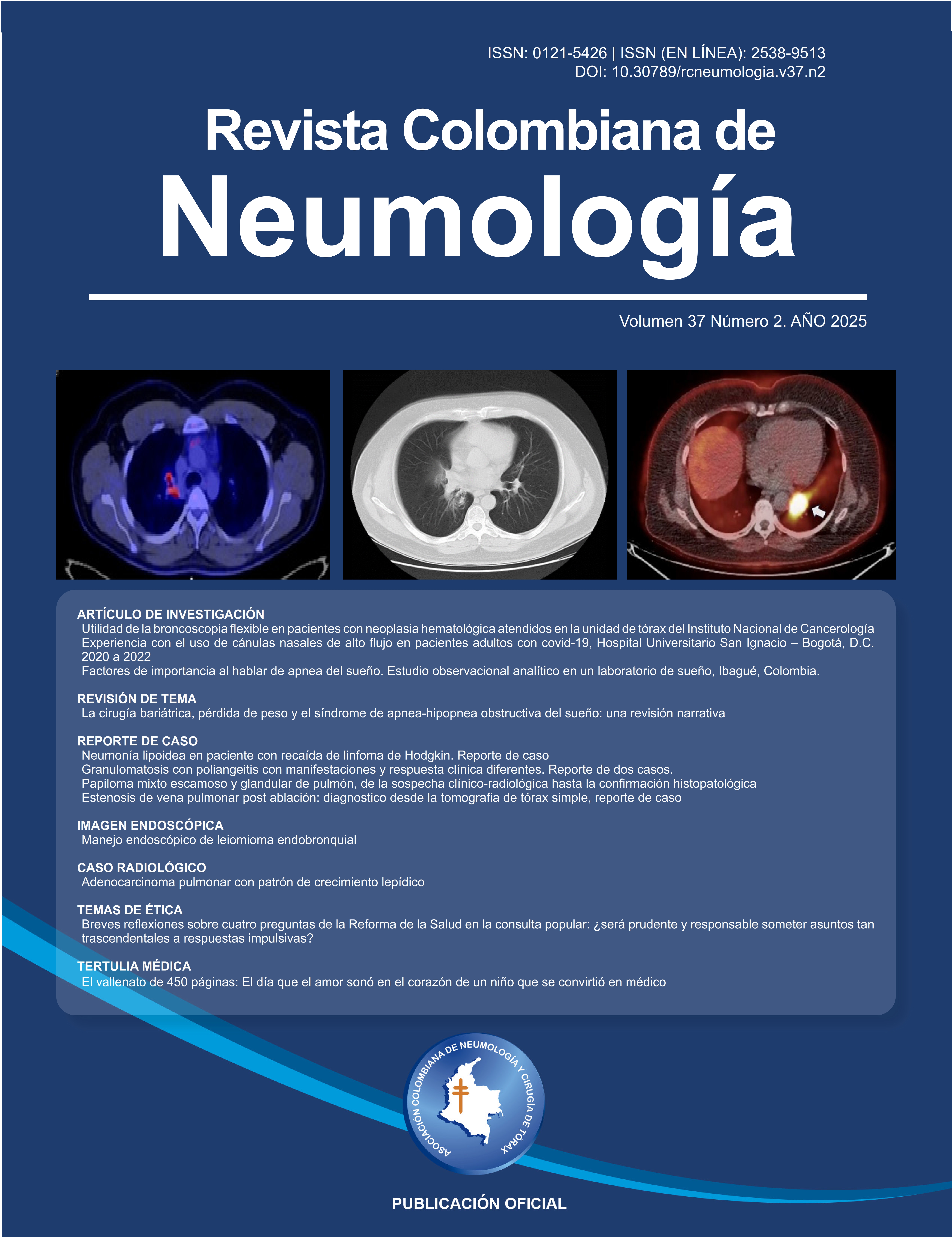Lepidic-predominant adenocarcinoma of the lung
Adenocarcinoma pulmonar con patrón de crecimiento lepídico

This work is licensed under a Creative Commons Attribution-NonCommercial-ShareAlike 4.0 International License.
Ninguna publicación, nacional o extranjera, podrá reproducir ni traducir sus artículos ni sus resúmenes sin previa autorización escrita del editor; sin embargo los usuarios pueden descargar la información contenida en ella, pero deben darle atribución o reconocimiento de propiedad intelectual, deben usarlo tal como está, sin derivación alguna.
Show authors biography
Lepidic-predominant adenocarcinoma of the lung presents a diagnostic challenge due to its clinical and radiological similarity to persistent pneumonia. Accurate histological, immunohistochemical and molecular characterization are essential for diagnosis. We present the case of a 50-year-old woman with a history of gynecological cancer who developed progressive dyspnea and multifocal lung consolidations initially misdiagnosed as pneumonia. The lack of response to antibiotics and persistent radiological findings led to invasive studies, which confirmed the diagnosis of mucinous lepidic adenocarcinoma.
This subtype of non-small cell lung cancer is characterized by superficial growth on the alveolar wall, low immunogenicity, and frequent KRAS mutations in mucinous variants. Surgery remains the standard treatment in early stages, while advanced cases have limited therapeutic options, with chemotherapy and palliative care being the main alternatives. Lepidic adenocarcinoma requires high clinical suspicion and a multidisciplinary approach for timely diagnosis and management, particularly in patients with persistent lung consolidations and atypical evolution.
Article visits 121 | PDF visits 79
Downloads
- Young TJ, Salehi-Rad R, Ronaghi R, Yanagawa J, Shahrouki P, Villegas BE, Cone B, Fishbein GA, Wallace WD, Abtin F, Barjaktarevic I. Predictors of Invasiveness in Adenocarcinoma of Lung with Lepidic Growth Pattern. Med Sci (Basel). 2022 Jun 22;10(3):34. doi: https://doi.org/10.3390/medsci10030034. PMID: 35893116; PMCID: PMC9326548. DOI: https://doi.org/10.3390/medsci10030034
- Kuhn E, Morbini P, Cancellieri A, Damiani S, Cavazza A, Comin CE. Adenocarcinoma classification: patterns and prognosis. Pathologica. 2018 Mar;110(1):5-11. PMID: 30259909.
- Jones KD. Whence lepidic?: the history of a Canadian neologism. Arch Pathol Lab Med. 2013 Dec;137(12):1822-4. doi: https://doi.org/10.5858/arpa.2013-0144-HP. Epub 2013 Aug 12. PMID: 23937575. DOI: https://doi.org/10.5858/arpa.2013-0144-HP
- Niedermaier B, Allgäuer M, Muley T, Schneider MA, Eichhorn ME, Winter H, Klotz LV. Intratumor Heterogeneity Predicts Prognosis in Lepidic Predominant Lung Adenocarcinoma. Thorac Cancer. 2025 Jan;16(1):e15536. doi: https://doi.org/10.1111/1759-7714.15536. DOI: https://doi.org/10.1111/1759-7714.15536
- Ziora P, Skiba H, Kiczmer P, Zaboklicka N, Wypyszyńska J, Stachura M, Sito Z, Rydel M, Czyżewski D, Drozdzowska B. Ten-Year Observational Study of Patients with Lung Adenocarcinoma: Clinical Outcomes, Prognostic Factors, and Five-Year Survival Rates. J Clin Med. 2025 Apr 8;14(8):2552. doi: https://doi.org/10.3390/jcm14082552. DOI: https://doi.org/10.3390/jcm14082552
- Xiong Y, Cheng L, Zhou YJ, Ge WH, Qian M, Yang H. Diagnosis and treatment of lung cancer: A molecular perspective. World J Clin Oncol. 2025 Mar 24;16(3):100361. doi: https://doi.org/10.5306/wjco.v16.i3.100361. DOI: https://doi.org/10.5306/wjco.v16.i3.100361
- Nicholson AG, Tsao MS, Beasley MB, Borczuk AC, Brambilla E, Cooper WA, Dacic S, Jain D, Kerr KM, Lantuejoul S, Noguchi M, Papotti M, Rekhtman N, Scagliotti G, van Schil P, Sholl L, Yatabe Y, Yoshida A, Travis WD. The 2021 WHO Classification of Lung Tumors: Impact of Advances Since 2015. J Thorac Oncol. 2022 Mar;17(3):362-387. doi: https://doi.org/10.1016/j.jtho.2021.11.003. DOI: https://doi.org/10.1016/j.jtho.2021.11.003
- Forsythe ML, Alwithenani A, Bethune D, Castonguay M, Drucker A, Flowerdew G, French D, Fris J, Greer W, Henteleff H, MacNeil M, Marignani P, Morzycki W, Plourde M, Snow S, Xu Z. Molecular profiling of non-small cell lung cancer. PLoS One. 2020 Aug 5;15(8):e0236580. doi: https://doi.org/10.1371/journal.pone.0236580. DOI: https://doi.org/10.1371/journal.pone.0236580
- Xu L, Tavora F, Battafarano R, Burke A. Adenocarcinomas with Predominant Lepidic Spread: Retrospective Review Applying New Classification of the American Thoracic Society. Am. J. Surg. Pathol. 2012;36:273-282. doi: https://doi.org/10.1097/PAS.0b013e31823b3eeb. DOI: https://doi.org/10.1097/PAS.0b013e31823b3eeb
- Akhtar Z, Laageide L, Robles J. et al. Unusual presentation of lepidic adenocarcinoma in a healthy female. BMC Pulm Med 2022;22:197. https://doi.org/10.1186/s12890-022-01969-1 DOI: https://doi.org/10.1186/s12890-022-01969-1
- Duan HF, Dang S, Yu N, Chen Y, Han D, Yu Y, Duan X. Magnetic resonance imaging of focal organizing pneumonia: differential diagnosis with peripheral lung carcinoma. Acta Radiol. 2025 Apr;66(4):359-367. doi: https://doi.org/10.1177/02841851241309007. DOI: https://doi.org/10.1177/02841851241309007
- Iwata H. Adenocarcinoma containing lepidic growth. J Thorac Dis. 2016 Sep;8(9):E1050-E1052. doi: https://doi.org/10.21037/jtd.2016.08.78. DOI: https://doi.org/10.21037/jtd.2016.08.78
- Thunnissen E, Beasley MB, Borczuk A, Dacic S, Kerr KM, Lissenberg-Witte B, et al. Defining Morphologic Features of Invasion in Pulmonary Nonmucinous Adenocarcinoma With Lepidic Growth: A Proposal by the International Association for the Study of Lung Cancer Pathology Committee. J Thorac Oncol. 2023 Apr;18(4):447-462. doi: https://doi.org/10.1016/j.jtho.2022.11.026. DOI: https://doi.org/10.1016/j.jtho.2022.11.026







